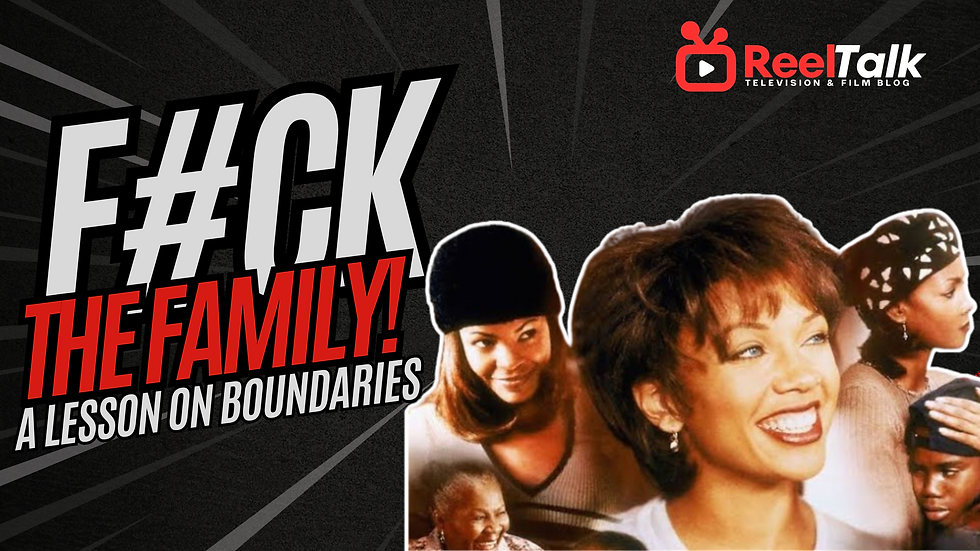The Weight of Blame in Mare of Easttown
- ReelTalk Blog

- Sep 10, 2025
- 3 min read

First, let me start with a confession: I didn’t even recognize the main character at first. About three episodes in, I finally blurted out, “Wait—she looks familiar!” (Spoiler: it’s Kate Winslet, in one of her best performances ever.)
Mare of Easttown is that rare blend of small-town murder mystery and raw family drama that hooks you from the very first episode. But instead of walking you through the entire series beat by beat, I want to focus on one of its most consistent and most haunting themes: blame.
Sure, on the surface it’s about finding out who murdered a teenage girl. Someone has to be blamed for the crime, right? But the show digs deeper. Blame isn’t just about justice in Easttown, it’s the undercurrent shaping every relationship, every accusation, every fracture in the community. And no one carries more of it than Mare.
Mare Sheehan: The Center of It All
Mare is a divorced detective in the small (fictional) town of Easttown, Pennsylvania. Until recently, her caseload consisted of the usual small-town crimes like petty theft, neighbor disputes, minor drug busts. But then her son Kevin died by suicide, and suddenly, Mare became a woman trying to hold together a family, a career, and a community while buried under grief she doesn’t know how to face.
In the very first episodes, we see how that grief ties into blame:
At a press conference, Dawn Bailey (Mare’s former best friend) calls her out publicly for failing to find her missing daughter, Katie. The pain is real as Dawn has cancer, she’s losing hope, and she needs someone to hold accountable. But the tragedy is sharper because Dawn and Mare were once teammates, friends, family. Now Dawn looks into Mare’s eyes and sees only failure.
Mare self blames herself for Kevin’s death, for her broken relationship with her daughter, for failing at work. She hides it under sarcasm and cynicism, but it’s eating her alive.
As a viewer, you can’t help but wonder: how much blame can one person carry before it crushes them?
Blame in the Community
Then comes Erin McMenamin, a teenage girl whose murder shatters what’s left of Easttown’s fragile sense of stability. Once Erin’s body is discovered, the entire community spirals into suspicion.
Everyone blames someone:
Dylan, Erin’s ex, is blamed for being abusive.
Deacon Mark, the local priest, is blamed for getting too close.
Neighbors whisper, families fracture, friendships dissolve.
The more the blame spreads, the heavier it gets, pressing down on an entire town already straining under poverty, addiction, and loss. Watching Easttown unravel feels like watching blame itself turn toxic; less about finding truth and more about easing pain through finger-pointing.
Mare’s Burden
Through it all, Mare becomes a mirror for what blame does to us:
She pours herself into solving Erin’s case while her own family life crumbles. The harder she works, the more disconnected she becomes at home. Who is really paying the price?
She lashes out and makes reckless decisions like trying to sabotage her grandson’s mother’s custody rights all because she can’t forgive herself for Kevin’s death.
She tries to shoulder everyone else’s grief, but never her own.
What struck me most is that blame never actually resolves grief. It just masks it. For Mare, real healing doesn’t begin until she stops assigning blame (to herself, to others, to the world) and finally accepts that some things can’t be controlled, only lived with.
The Bigger Lesson
In the end, Mare of Easttown isn’t just about who killed Erin. It’s about how blame circulates through families, friendships, and whole communities when tragedy strikes.
Mare’s journey reminds us of something we often forget: blame might feel like resolution, but most of the time, it only deepens the wound. The real challenge is acceptance and learning to carry grief without letting it define us.
I won’t spoil the twists and turns of the finale, because trust me, this show is binge-worthy and best experienced fresh. But if you watch closely, you’ll see that Mare of Easttown is less about solving a crime and more about understanding how humans navigate the unbearable weight of blame.
So grab a blanket, block off a weekend, and watch it. Then come back and tell me: how much of Mare do you see in yourself?







Comments